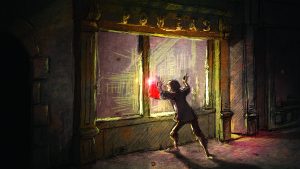Certainly, I suffered Gaelic hardship throughout my life – distress, need, ill-treatment, adversity, calamity, foul play, misery, famine and ill-luck.
As part of Birkbeck's Arts Week 2018, the Centre for Contemporary Literature supported an event that completed a trilogy of annual workshops on the brilliant first three novels by the Irish writer Flann O'Brien. Gaelic Hardship explored his third novel An Béal Bocht, written in Irish in 1941 and published under the name Myles na gCopaleen – which was the pen-name that Brian O'Nolan, the creator of 'Flann O'Brien', had adopted as a newspaper columnist. O'Nolan (1911-1966) refused to permit an English translation of the novel during his lifetime, just as he refused to countenance a second attempt to publish his rejected manuscript Third Policeman (written in 1940 and the subject of last year's workshop). Yet just as that novel was published a year after his death, so too in 1973 an English translation of An Béal Bocht appeared, as The Hard Life, translated by Patrick C. Power. It is in this form that this slim volume has become known to the largest number of readers, though there are still calls for a new translation and suggestions that Power's version omits important aspects of the original.
Given the linguistic complexities involved, organizers Joseph Brooker and Tobias Harris (Birkbeck) this time enlisted the expertise of Eoin Byrne, who is working at the University of Galway on a project about bilingual writers including Samuel Beckett as well as Brian O'Nolan. After our introductions to the area and to O'Nolan's career trajectory, Eoin offered an incisive account of key issues around this novel, including the state of Irish-language publishing in the early 1940s and the 'Gaeligores' or Irish-language enthusiasts satirized in the novel. With members of the audience joining in discussion, the workshop was then enriched by readings of particular passages: Hugh Wilde recited an early passage where the English-speaking schoolmaster beats the protagonist's Irish name out of him, and N.J. Harris read the close of the novel, where poignancy seemed to take over from comedy. In the meantime we also looked at Myles na gCopaleen's satiric portrayal of a Gaelic festival at which numerous local Gaels die of rain, starvation, drink or exhaustion from excess of Gaelic dancing; Eoin read the passage aloud in Irish.
An Béal Bocht / The Poor Mouth has perhaps been overshadowed by its brilliant precursors At Swim-Two-Birds and The Third Policeman, but this workshop placed it centre stage, reminding us of the ferocity of its irony and the sense that – as Eoin finally put it, deliberately echoing Richard Ellmann's words about James Joyce – we are still learning to be its contemporaries.
A report on the event, by audience member, Charlotte Deadman, has been posted on the Birkbeck Events Blog.
Image from the film An Béal Bocht / The Poor Mouth (2017), reproduced with permission from Raw Nerve Productions


Recent Comments